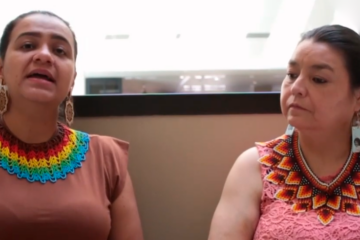Rejane Medeiros lives in Rio Grande do Norte (herein referred to as RN), a state in Northeastern Brazil. She has been a member of the World March of Women since the early 2000s. She had her first contact with the feminist movement through Centro Feminista 8 de Março (herein referred to as CF8) [March 8th Feminist Center], an organization based in the city of Mossoró that carries out feminist-based processes of training, self-organization, and mobilization of women. From 2003 on, Medeiros joined the Center’s team, where she continues to work to this day.
In this interview, Rejane Medeiros shares experiences of building popular feminism on the streets, networks and farmlands of Rio Grande do Norte and Brazil. “The March changed our view of feminism, articulating the local perspective with the global one”, says Medeiros. Within this articulation, women fully strengthen their autonomy and establish deep bonds of companionship based on self-organization and solidarity. They come together to also share and develop a critical vision of the capitalist, racist, and patriarchal economic model; identify false green economy solutions that threaten their communities, neighborhoods and backyards; and create a diverse feminism, investing in agroecology, movement building, and sustainability of life to change the world and women’s lives.
*
How do CF8 and the World March of Women in Rio Grande do Norte and Brazil feed into each other?
In CF8, we came into contact with SOF Sempreviva Feminist Organization, through Nalu Faria in late 1990s. Upon contacting her, we started to hold feminist trainings and debates beyond the boundaries of the city of Mossoró. We were part of it from the beginning, when the March started the process of articulating the campaign in 2000. This relationship with SOF has made us build things together since then, and this has strengthened the process of building the March in RN.
The March changed our view of feminism, articulating the local perspective with the global one. We who usually work with rural women often say that when they are building self-organization in their communities, settlements, or when they are producing agro ecologically, all of these actions are related to feminism. They are also debating food sovereignty, strengthening this debate and coordination with women from other places.
What has shaping feminism and women’s self-organization been like in rural areas? What are the main barriers and alternatives?
Self-organization is central to women’s struggle. Women in the community and in the settlement who come together to discuss cases of violence end up organizing and mobilizing. From self-organization, women reflect upon alternatives for generating income, such as the experience we have in beekeeping production. From the experiences that women develop, they also realize that it is possible for them to do whatever they want. Women come together to discuss these income alternatives, whether credit alternatives, or reflecting upon food production, which both strengthens their families’ nutrition and provides goods for commercialization. Thus, we can approach the debate on solidarity economy: trade must foster fair prices and we would like to have a direct relationship with those who consume our products.
Many experiences have been built upon self-organization as well as the fight against pesticides, companies seeking to operate in the territories, and the impacts of wind energy. Companies advertise sustainable and renewable energy but they directly affect women’s lives. Building strategies to cope with impacts, life alternatives, shaping our own World March of Women makes women feel stronger. In 2012, “Somos Todas Apodi [We are Apodi]” campaign was formed internationally. This made the women on site feel more empowered because they knew they were not alone.
Beekeepers say that bees are like us women because they are very tight-knit. If you mess up with one of them, you’ve messed up with them all.
Rejane Medeiros
There are several confrontation episodes in Brazil’s Northeast, such as agribusiness, transnational companies, false solutions for climate, desertification. How have women and social movements dealt with such forms of confrontation? And, how can we raise awareness and foster debate on such issues?
We have not built revolution by ourselves. “Somos Todas Apodi [We are Apodi]” campaign is an example of the search for allies to build joint actions in an articulated manner. In addition to the March, the Semiarid Articulation (ASA, acronym in Brazilian Portuguese) and the trade union movement joined the action. Together, these organizations have discussed with residents the impacts of the irrigated perimeter in the region on people’s lives.
Currently, we have been experiencing the impacts of renewable energy. Brazil’s Northeast is full of wind energy and solar energy [developments], which are portrayed as a solution to climate issues and saving the planet. This is a difficult debate because, first, we have to say we are not against renewable energy. Then, we must further explain it so that people can understand what the impacts are on the communities where these technologies have been implemented. It is difficult to keep dialogue because all progressive administrations are motivated by this developmental agenda.
Although we cannot reverse the implementation of parks in communities where the equipment is already operating, the process of articulating organizations helps to strengthen the fight to prevent implementation in other territories. Since expansion is expected, the government even advertises the production of wind energy on high seas having a high impact on marine life. We want to further focus on legislation because companies find many loopholes to exploit nature. They do so due to the lack of laws or control bodies to monitor activities.
An important process that the March has carried out was to promote exchange visits to areas in RN and also in the Polo da Borborema, in Paraíba, which is targeted to become home to the parks. The exchange process that the March has offered, by providing opportunities for reflection and experiences, has strengthened women-led debates and actions. Shaping alternatives is a powerful aspect of the March. And it is articulated: it both strengthens the local process and other processes in other territories.
How do agroecology and the solidarity economy show in your organization’s routine? And what do these practices point to as regards feminism’s political agenda?
In CF8, when we started doing self-organization work with women’s groups, before the March even existed, our role was to discuss women’s rights and strengthen self-organization. Women needed to exercise freedom, equality, autonomy. Rural women began to demand that, in order to have equality and freedom and overcome violence, they needed to have an income. This challenge made us truly consider carrying out collective productive activities. We started organic agriculture, reflected on the solidarity economy and the debate began to change. From experiences and relationships with other groups, exchange experiences, the debate on agroecology has emerged. Today, we produce goods in an agroecological and diverse way. We started taking ownership of the issues women would introduce us to.
Shaping the feminist struggle also means feeding women’s production experiences. This makes us build our struggle together.
Rejane Medeiros
Oftentimes, some things seem not to belong. In the debates on violence we held at the Feminist Center, we would discuss the “cycle of violence”, as if violence had a cycle but it is not set like that. Based on the experiences, the daily lives of women, the debate on production, feminism articulated with the solidarity economy — which we later elaborated further and also started to debate feminist economics — we have identified some connections. For example, at an agroecology meeting, women have drafted a letter focusing on the issue of violence and arguing that a plant cannot be free of poison and tainted by women’s blood.
By strengthening women in the community, when there is a case of violence, they call the community and make sure the issue is discussed in the [resident’s] association. Women’s process of mobilization and self-organization forges and articulates debates, which do not occur separately. The debate on economic autonomy is articulated with the fight for a new world, showing solidarity with the struggles of other peoples and the processes of women in their areas, whether for solidarity economy or production. This is a great learning experience.




